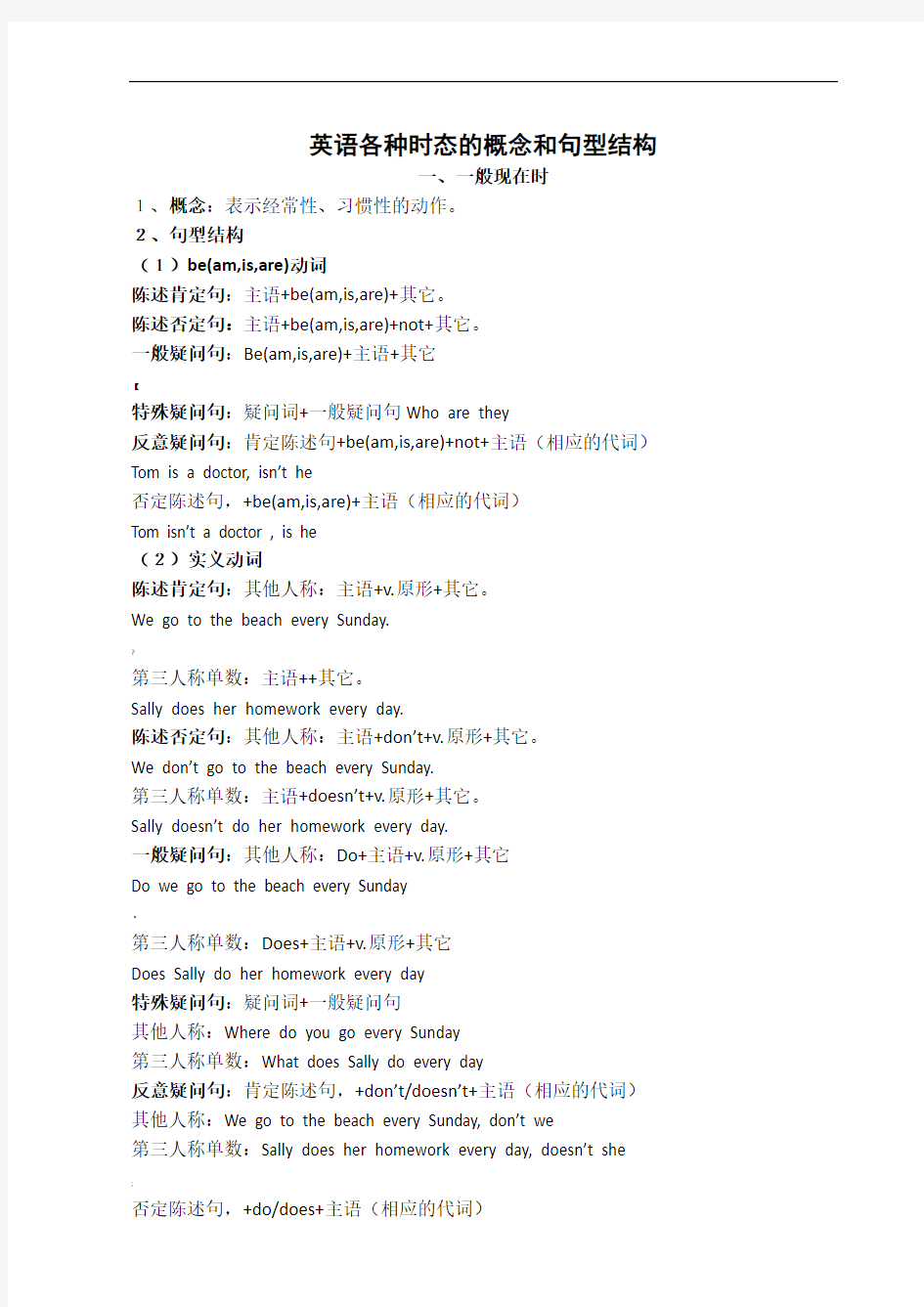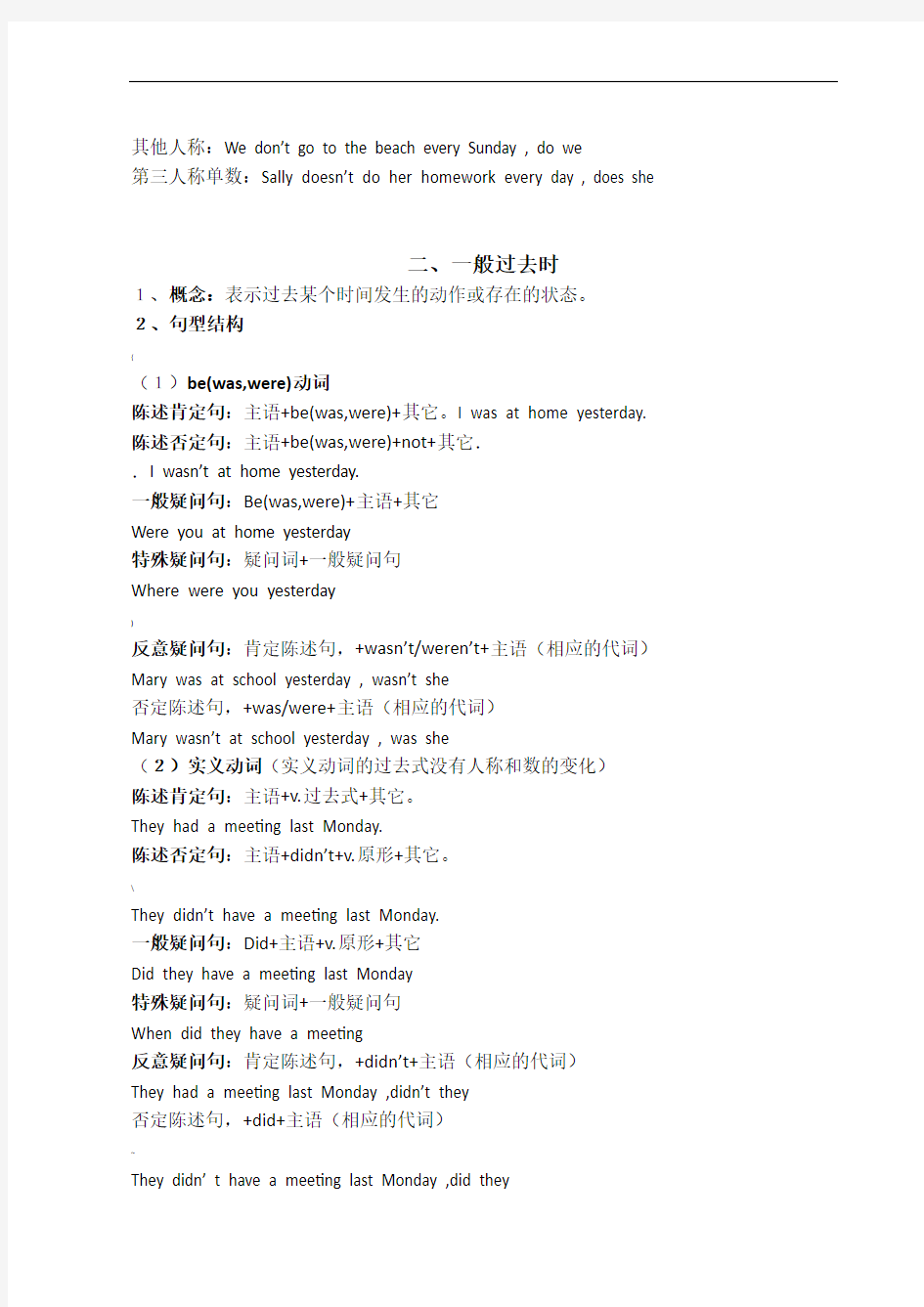英语各种时态的概念和句型结构1


英语各种时态的概念和句型结构
一、一般现在时
1、概念:表示经常性、习惯性的动作。
2、句型结构
(1)be(am,is,are)动词
陈述肯定句:主语+be(am,is,are)+其它。
陈述否定句:主语+be(am,is,are)+not+其它。
一般疑问句:Be(am,is,are)+主语+其它
【
特殊疑问句:疑问词+一般疑问句Who are they
反意疑问句:肯定陈述句+be(am,is,are)+not+主语(相应的代词)Tom is a doctor, isn’t he
否定陈述句,+be(am,is,are)+主语(相应的代词)
Tom isn’t a doctor , is he
(2)实义动词
陈述肯定句:其他人称:主语+v.原形+其它。
We go to the beach every Sunday.
?
第三人称单数:主语++其它。
Sally does her homework every day.
陈述否定句:其他人称:主语+don’t+v.原形+其它。
We don’t go to the beach every Sunday.
第三人称单数:主语+doesn’t+v.原形+其它。
Sally doesn’t do her homework every day.
一般疑问句:其他人称:Do+主语+v.原形+其它
Do we go to the beach every Sunday
·
第三人称单数:Does+主语+v.原形+其它
Does Sally do her homework every day
特殊疑问句:疑问词+一般疑问句
其他人称:Where do you go every Sunday
第三人称单数:What does Sally do every day
反意疑问句:肯定陈述句,+don’t/doesn’t+主语(相应的代词)其他人称:We go to the beach every Sunday, don’t we
第三人称单数:Sally does her homework every day, doesn’t she
;
其他人称:We don’t go to the beach every Sunday , do we
第三人称单数:Sally doesn’t do her homework every day , does she
二、一般过去时
1、概念:表示过去某个时间发生的动作或存在的状态。
2、句型结构
{
(1)be(was,were)动词
陈述肯定句:主语+be(was,were)+其它。I was at home yesterday.陈述否定句:主语+be(was,were)+not+其它.
.I wasn’t at home yesterday.
一般疑问句:Be(was,were)+主语+其它
Were you at home yesterday
特殊疑问句:疑问词+一般疑问句
Where were you yesterday
)
反意疑问句:肯定陈述句,+wasn’t/weren’t+主语(相应的代词)Mary was at school yesterday , wasn’t she
否定陈述句,+was/were+主语(相应的代词)
Mary wasn’t at school yesterday , was she
(2)实义动词(实义动词的过去式没有人称和数的变化)
陈述肯定句:主语+v.过去式+其它。
They had a meeting last Monday.
陈述否定句:主语+didn’t+v.原形+其它。
\
They didn’t have a meeting last Monday.
一般疑问句:Did+主语+v.原形+其它
Did they have a meeting last Monday
特殊疑问句:疑问词+一般疑问句
When did they have a meeting
反意疑问句:肯定陈述句,+didn’t+主语(相应的代词)
They had a meeting last Monday ,didn’t they
否定陈述句,+did+主语(相应的代词)
~
They didn’ t have a meeting last Monday ,did they
[
三、现在进行时
1、概念:表示正在发生的动作,也可以用来表示按计划或安排将要进行的动作,有“意图”或“打算”等含义。
2、构成:be(am,is,are)+
3、句型结构
陈述肯定句:主语+be(am,is,are)++其它。
Mike is listening to music.
<
陈述否定句:主语+be(am,is,are)+not++其它。
Mike isn’t l istening to music.
一般疑问句:Be(am,is,are)+主语++其它
IsMikelisteningtomusic
特殊疑问句:疑问词+一般疑问句
Whoislisteningtomusic
反意疑问句:肯定陈述句,+be(am,is,are)+not+主语(相应的代词)Mikeislisteningtomusic,isn’the
<
否定陈述句,+be(am,is,are)+主语(相应的代词)
Mike isn’t listening to music ,is he
,
<
四、过去进行时
1、概念:表示在过去某一特定的时刻或某一段时间正在发生的动作。【
2、构成:be(was,were)+
3、句型结构
陈述肯定句:主语+be(was,were)++其它。
They were working this time yesterday.
陈述否定句:主语+be(was,were)+not++其它。
They weren’t working this time yesterday.
一般疑问句:Be(was,were)+主语++其它
Were they working this time yesterday
—
特殊疑问句:疑问词+一般疑问句
What were they doing this time yesterday
反意疑问句:肯定陈述句,+wasn’t/weren’t+主语(相应的代词)They were working this time yesterday , weren’t they
否定陈述句,+was/were+主语(相应的代词)
They weren’t working this time yesterday ,were t hey
《
\
】
五、一般将来时
1、概念:表示将来某个时间要发生的动作或存在的状态。
2、构成:will(用于所有人称)/shall(只用于第一人称)+v.原形3、句型结构
陈述肯定句:主语+will+v.原形+其它。
`
Tina will buy a new pen next month.
陈述否定句:主语+won’t+v.原形+其它。
Tina won’ t buy a new pen next month.
一般疑问句:Will+主语+v.原形+其它
Will Tina buy a new pen next month
特殊疑问句:疑问词+一般疑问句
When will Tina buy a new pen
反意疑问句:肯定陈述句,+won’t+主语(相应的代词)
%
Tina will buy a new pen next month ,won’t she
否定陈述句,+will+主语(相应的代词)
Tina won’t buy a new pen next month ,will she
1、概念:begoingto+v.原形表示将要发生的事或打算、计划、决定要做的事情。
2、构成:begoingto+v.原形
3、句型结构
陈述肯定句:主语+be going to+v.原形+其它。
!
Tony is going to be a doctor when he grows up.
陈述否定句:主语+be+not+goingto+v.原形+其它。
Tony isn’t going to be a doctor when he grows up.
一般疑问句:Be+主语+goingto+v.原形+其它
Is Tony going to be a doctor when he grows up
特殊疑问句:疑问词+一般疑问句
WhatisTonygoingtobewhenhegrowsup
反意疑问句:肯定陈述句,+be+not+主语(相应的代词)
]
Tonyisgoingtobeadoctorwhenhegrowsup,isn’the
否定陈述句,+be+主语(相应的代词)
Tonyisn’tgoingtobeadoctorwhenhegrowsup,ishe
,
六、过去将来时
1、概念:表示从过去某一时间看来将要发生的动作或存在的状态。过去将来时常用于宾语从句中。
2、构成:would+v.原形
3、句型结构
陈述肯定句:主语+would+v.原形+其它。
Wang Ling would visi ther uncle.
陈述否定句:主语+wouldn’t+v.原形+其它。
Wang Ling wouldn’t visit her uncle.
~
一般疑问句:Would+主语+v.原形+其它
Would Wang Ling visit he runcle
特殊疑问句:疑问词+一般疑问句
反意疑问句:肯定陈述句,+wouldn’t+主语(相应的代词)
Wang Ling would visit her uncle ,wouldn’t she
否定陈述句,+would+主语(相应的代词)
Wang Ling wouldn’t visit her uncle ,would she
—
《
。
七、现在完成时
1、概念:
(1)表示过去发生或已经完成的某一动作对现在造成的影响或结果。
(2)表示过去已经开始,持续到现在的动作或状态,可以和表示从过去某一时刻延续到现在(包括“现在”在内)的一段时间的状语连用。表示动作或状态的动词多是延续性动词。
%
2、构成:have/has+v.过去分词
3、句型结构
I have already seen the film.
陈述否定句:主语+haven’t/hasn’t+v.过去分词+其它。
I haven’t seen the film yet.
一般疑问句:Have/Has+主语+v.过去分词+其它
Have you seen the film yet
、
特殊疑问句:疑问词+一般疑问句
Who have seen the film
反意疑问句:肯定陈述句,+haven’t/hasn’t+主语(相应的代词)
They have seen the film ,haven’t they
否定陈述句,+have/has+主语(相应的代词)
They haven’ t seen the film ,have they
¥
、
八、过去完成时
1、概念:表示在过去某一时间或动作之前已经完成了的动作。它表示动作发生的时间是“过去的过去”。表示过去某一时间可用等构成的短语。
2、构成:had+v.过去分词
3、句型结构
Tim had reached the station before ten o’clock.
陈述否定句:主语+hadn’t+v.过去分词+其它。
Tim hadn’t reached the station before ten o’clock.
一般疑问句:Had+主语+v.过去分词+其它
Had Tim reached the station be fore ten o’clock
特殊疑问句:疑问词+一般疑问句
When had Tim reached the station
反意疑问句:肯定陈述句,+hadn’t+主语(相应的代词)Tim had reached the station before ten o’clock,hadn’t he
否定陈述句,+had+主语(相应的代词)
Tim hadn’t reached the station before ten o’clock,had he
感叹句What+n.+主语+谓语!
What fine weather it is today!
What an interesting story it is!
How+adj./adv.+主语+谓语!
How cold it is today!
How fast they are running!
祈使句肯定句:v.原形+其它.Open the it like this.
否定句:Don’t+v.原形+其它.Don’t open the door. Don’t do it like this.
